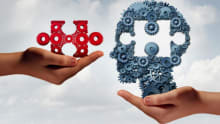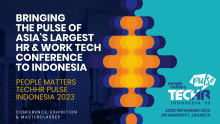Redefining ‘Human’ in HR

Imagine two employees in an organization.
The first one is randomly exposed to activity-based, open office culture. She enjoys the perks of a very well-designed transition framework and office amenities. But somehow, she’s stuck in a loop of complaints and exhibits low engagement and productivity.
Whereas, the second employee experiences tailored perks that are based on the nature of her work – why she works the way she does. She enthusiastically supports the process, contributes new ideas, and continues to add value.
What has this got to do with Human Resources?
Often ‘Human Resources’ is associated with the function in an organization that handles the management of people. Redefining the human in human resources means infusing more humanity into the workplace for those human beings who happen to be employees—by digging deeper to understand what truly drives them.
Every individual brings in a set of values when focused on a task at hand. It is these values that help build a strong team foundation and an even stronger company culture. These values are materialized by converting them into behavioral examples. Rewarding behaviors that demonstrate each value, leads to employees eventually inheriting the company’s core values without getting lost in the hustle and bustle of the workday.
Humanely vs Humanly
This brings us to the humanity element of an organization. Treating employees humanly is when employees are appreciated and feel like they belong, whereas offering no time flexibility becomes inhumane. Then, why do we work every day – why do we work at all? Yes, monetary compensations play a huge role, but when you ask engaged employees about their reason to work, the question on the monetary element almost never comes up. Instead, the list of non-monetary reasons overpowers the - ‘to make a living’ reason.
In today’s digitized workplace where work is becoming more meaningful for all the involved stakeholders, enabling the people behind your people starts with taking employees’ satisfaction, suggestions, and concerns on the highest priority, and we do just that!
We encourage our employees to believe in their abilities, express their opinions freely, take up challenges, and produce quality output. This involves—
- To build and retain a pool of talented professionals within the organization
- To provide opportunities for continual professional and personal growth of employees
- To respect individual opinion while boosting team spirit across the organization
- To operate with a strong belief in employee participation for continuous knowledge and process improvement
Similarly, by implementing a design-thinking approach, organizations can find ways to reveal a sense of meaning that drive engagement, motivation, and growth.
One such approach in the digital space is combining data and people with analytics. In order to use digitization to promote humanness, we can develop strategies to engage employees, design career trainings and development plans, alter performance evaluation, hire for skills rather than qualifications, and nurture them for their valuable contributions. All of this can be backed by data and executed by technology.
Four abbreviations that humanize work
Human Respect
Respect is the most important prerequisite for a healthy work environment. It facilitates teamwork and boosts productivity and engagement. It is the ingredient that makes employees feel valued for their capabilities and accomplishments while highlighting the importance of the role they play in the company's success.
Human Responsibility
In a workplace scenario, every individual is responsible for herself, her team, and the organization at large. The responsibilities such as imparting day-to-day performance management guidance or managing and resolving complex employee issues; promotes ownership of one’s work, increases transparency, and humanizes the workforce.
Human Response
Communication is not just relaying information from one source to the other. Neither it is necessarily verbal. Facilitating two-way communication by not just reacting to the situation but by analyzing its sensitivity and then responding imbibes a sense of trust among the employees towards the employer, creates a positive work culture, and boosts employee morale.
Human Reasoning
Reasoning is the ability of an individual to consider all the facts and perspectives to analyze a concept objectively and reach a logical conclusion. Appreciating the reasoning component by placing a high value on the employee who makes decisions free of emotions and backed by data, eliminates biases, and ensures smooth decision making across levels.
In the end
As automation and robotics is taking over, we are at risk of losing the human element. But these advancements in technology should be cost, time, and efficiency savers that confer HR with the freedom required to channelize their energies on focusing on human needs and engagements.
Because, bringing together the best of people and technology can help build a healthier, happier, and a more productive organization that links the right talent to value. We believe that every organization rests on a goldmine of people's potential. And only a humanly approach can help unlock it.















